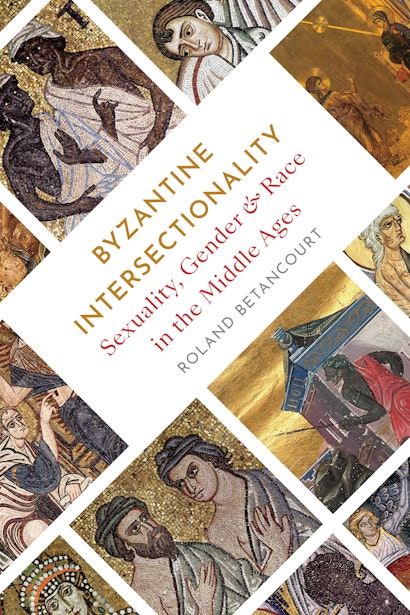While the term “intersectionality” was coined in 1989, the existence of marginalized identities extends back over millennia. Byzantine Intersectionality reveals the fascinating, little-examined conversations in medieval thought and visual culture around sexual and reproductive consent, bullying and slut-shaming, homosocial and homoerotic relationships, trans and nonbinary gender identities, and the depiction of racialized minorities. Roland Betancourt explores these issues in the context of the Byzantine Empire, using sources from late antiquity and early Christianity up to the early modern period. Highlighting nuanced and strikingly modern approaches by medieval writers, philosophers, theologians, and doctors, Betancourt offers a new history of gender, sexuality, and race.
Betancourt weaves together art, literature, and an impressive array of texts to investigate depictions of sexual consent in images of the Virgin Mary, tactics of sexual shaming in the story of Empress Theodora, narratives of transgender monks, portrayals of same-gender desire in images of the Doubting Thomas, and stereotypes of gender and ethnicity in representations of the Ethiopian Eunuch. He also gathers evidence from medical manuals detailing everything from surgical practices for late terminations of pregnancy to save a mother’s life to a host of procedures used to affirm a person’s gender.
Showing how understandings of gender, sexuality, and race have long been enmeshed, Byzantine Intersectionality offers a groundbreaking look at the culture of the medieval world.
Awards and Recognition
- Finalist for the Award for Excellence in the Study of Religion, Historical Studies, American Academy of Religion
- Winner of the Jerome E. Singerman Prize, Medieval Academy of America
"[Byzantine Intersectionality] quotes Monica Lewinsky in its epigraph and brings an activist’s zeal to its queer-theory close readings of texts and images from the Eastern Roman Empire between the fourth and fifteenth centuries. By scouring legal, medical, and religious sources, and reading misogynist invectives against the grain, Betancourt builds a fascinating picture of more fluid attitudes and practices around sexuality than have been suggested in the mainstream historical record. . . . The details Betancourt excavates can be as illuminating as they are juicy."—Lidija Haas, Harper's Magazine
"[Byzantine Intersectionality] raises timely and pressing questions about gender, sexuality, marginalized groups, and diversity in the medieval Roman Empire. . . . This indispensable book makes clear that the study of Byzantine art is relevant and pressing today."—Armin Bergmeier, Art Bulletin
"This book is for the outcast and for those who inhabit the margins of the past and present. . . . Byzantine Intersectionality provides art historians, archaeologists, and historians with a better theoretical basis for reconstructing the complex lived reality of queerness, sexual violence, consent, and racial profiling. The marginalized biblical figures and saints examined together serve as a new testament to how engrained systematic oppression functions in society."—Sarah E. Bond, Hyperallergic
"[The book’s title] refers to the interaction between gender, sexuality and race, how the intersections between these three separate things were understood in Byzantine society and how these understandings endured or shifted across the period of the Empire’s history from (roughly) the fourth century to the 15th. . . . The book is rooted in a huge number of meticulously studied late antique and medieval sources. Importantly, Betancourt allows them the freedom to speak for themselves."—Adele Curness, History Today
"[Byzantine Intersectionality] is an insightful and powerful new addition to not only Medieval Studies, but also History of Art, Critical Race Studies, Gender and Sexuality Studies and Queer Studies. . . . An exciting and radical new project with an ethical dimension and urgency, this text challenges the ways scholars have viewed Byzantine society and culture. . . . [This] innovative text provokes from the epigraph by Lewinsky to the final sentence with its ethical imperative for social and racial justice."—Meaghan Allen, LSE Review of Books
"A major accomplishment of [Byzantine Intersectionality] is its interdisciplinarity. As opposed to other scholars of the middle ages whose focus is narrowed to a specific discipline, Betancourt’s text covers the large disciplinary gaps between literary studies, art history, and historical studies, to create a wide-ranging view of the period and allowing scholars to create thematic connections previously unknown across the disciplines. . . . Another important aspect of this text is the potential implications for the field moving forward. Betancourt’s recalibration of the definitions of sexuality, gender, and race has opened countless doors for other medievalists to analyze literature, historical documents, and art for the sole purpose of expanding known histories of sex, gender, and race."—Morgan Connor, Pennsylvania Literary Review
"Every Byzantinist needs to read this book. . . . A highly stimulating and thought-provoking book. It is also a beautifully produced book."—Shaun Tougher, Medieval Encounters
"[A] provocative study of Byzantine sex and gender. . . . Byzantine Intersectionality is poised to make a difference. Wearing his ideology on his sleeve, Betancourt aims to compel Western medievalists to pay more attention to the East, while persuading conservative colleagues in his own field to broaden their views."—Barbara Newman, London Review of Books
"Byzantine Intersectionality is a compelling and timely intervention with methodological insights for the study of premodern history. Its significance lies in articulating not only the “why” but also advances on the “how” in terms of the unearthing of marginalized historical identities. . . . Betancourt [offers] a cogent demonstration that historical sources have more to tell us about the evolving landscape of consent, unequal access to reproductive healthcare, the politics of slut-shaming, transgender folk, same-gender desire, and how context affects the shifting intersections of ethnicity and gender."—Niamh Bhalla, Speculum
"Betancourt . . . [has produced] a methodologically complex and analytically nuanced study of Roman intersectional identities that adroitly draws on material culture, sacred art, and textual corpora that few scholars can navigate with such sophistication and dexterity. . . . Byzantine Intersectionality is a great service to scholars sympathetic to matters of social justice in relation to the excavation of the past, but who are unfamiliar with intersectional historiography. . . . Chapters Three and Five . . . are the most important contribution to the intersectional treatment of Roman transgender, nonbinary, and racialized identities so far penned by any scholar."—Luis Josué Salés, Journal of Early Christian Studies
"Byzantine Intersectionality takes up the challenge of reading ancient texts—visual and linguistic—through the lens of contemporary methodologies and, even more daringly, current social identities and concepts. Dazzling in its analysis, thoroughly researched, and theoretically illuminating, this book changes not only how we see the Byzantine era, but also the stakes of recent work in queer, transgender, and critical race studies. Byzantine Intersectionality is for anyone who wants to learn how the past makes the present new."—Elizabeth Freeman, author of Time Binds: Queer Temporalities, Queer Histories
"This radically interdisciplinary tour de force gives extraordinary insight into nonnormative Byzantine subjectivities while breathtakingly detailing how gender, race, and sexuality were understood and deployed. A magnificent book, Byzantine Intersectionality shows us how critical race theory and queer and transgender studies can change our understanding of the past."—Steven Nelson, author of From Cameroon to Paris: Mousgoum Architecture In and Out of Africa
"Byzantine Intersectionality aims at nothing less than the recuperation of trans identities of the premodern past. Skillfully bridging the chronological gap separating the Byzantine from the modern and beyond, Betancourt exploits the fecundity of anachronism. His engagement with materiality, and his exploration of the philosophical commitments pertaining to the relationship of form and matter, are nuanced and provocative."—Suzanne Conklin Akbari, author of Idols in the East: European Representations of Islam and the Orient, 1100–1450
"Byzantine Intersectionality makes claims about historically remote gender-variant subjects and minority sexualities that are bound to be controversial. Whatever readers may think about the historicization of sexuality and gender, however, they are sure to find material here that will challenge preconceived notions about the histories of race, gender, sexuality, and desire."—Jack Halberstam, author of Female Masculinity
"Essential and groundbreaking, Byzantine Intersectionality is a major contribution to the ongoing discussion in critical race studies and gender, sexuality, and transgender studies."—Dorothy Kim, author of The Alt-Medieval: Digital Whiteness and Medieval Studies
"Rich with startling and even alarming evidence, this book offers a timely and challenging perspective on Byzantine society and culture. Placing late ancient and medieval Greek texts and images into dialogue with some of the most pressing concerns of our own day, including gender, sexuality, race, and identity, Byzantine Intersectionality may be the most significant communication from Byzantine studies to the rest of the humanities this decade."—Derek Krueger, author of Liturgical Subjects: Christian Ritual, Biblical Narrative, and the Formation of the Self in Byzantium
"Provocative, imaginative, and original, Byzantine Intersectionality cuts across disciplines with an urgent and political voice. It investigates important topics and will stir up controversy and conversation."—Charles Barber, author of Figure and Likeness: On the Limits of Representation in Byzantine Iconoclasm


